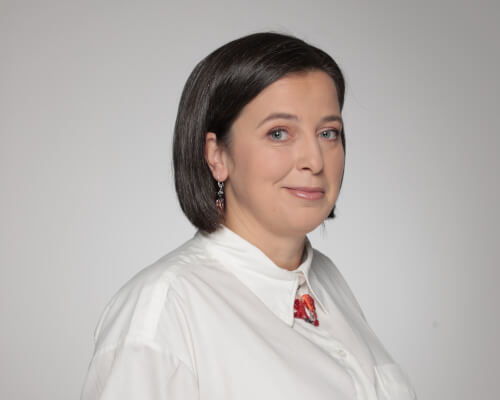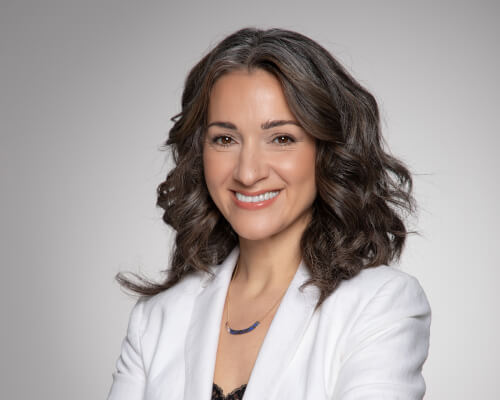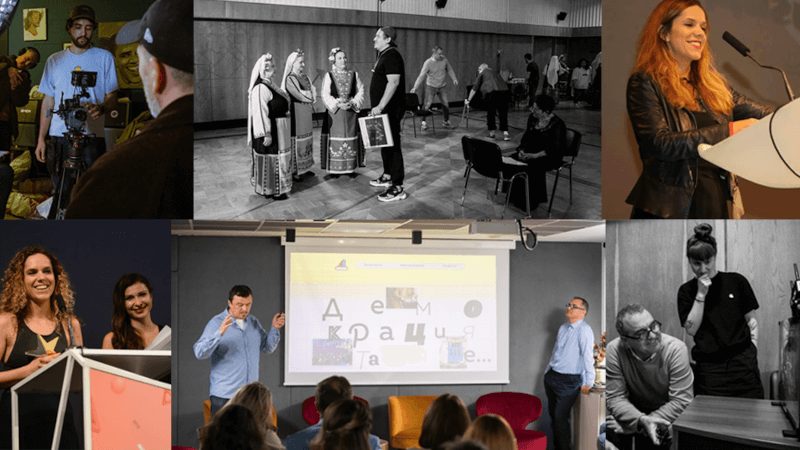
They are masters of the clever turn of phrase and the ad spot that leaves you speechless. Meet Ivelina Gicheva-Nikolova, Dobromir Dzhurov, and Ivan Hadzhivelikov — Iva, Dobri, and Ivan, for short — advertising veterans with more than 60 years of combined experience. They have frequently collaborated to create campaigns for some of the most recognizable Bulgarian and international brands, earning both awards and customer loyalty along the way.
Corporate social initiatives have been among the three’s favorite projects over the years, with parenthood deepening their desire to contribute to societal betterment. This led to several notable collaborative projects, including the documentary The Sweetest Thing, celebrating the thirtieth anniversary of Bulgarian democracy; The Eternal Hits of Bulgaria, a joint campaign with the Bulgarian Women’s Fund to promote awareness of violence toward women; and multiple collaborations with civil society organizations and socially engaged businesses.
As their involvement increased, the three realized that preserving democracy demands sustained, long-term efforts. This insight inspired Iva’s idea to create an advertising agency dedicated to the civic sector. She found a like-minded partner in the America for Bulgaria Foundation, leading to the establishment of The Convo at the end of 2023. The name of the trio’s initiative is inspired by the English words for conversation, convocation, and convoy, and the organization’s goals include not only enhancing dialogue within Bulgarian society but also boosting the visibility of civic organizations as vital to the health of democracy.
Six months into their endeavor, The Convo is actively fostering meaningful conversations. Judging a Book by Its Cover is a collaborative project with the Bulgarian Institute for Legal Initiatives, aimed at promoting awareness of democratic rights, freedoms, and obligations as outlined in the Constitution of the Republic of Bulgaria. Another exciting initiative, The Mystery of Bulgarian Voices, developed in partnership with the Institute for Public Environment Development, seeks to boost voter turnout.
On May 9, Europe Day, The Convo and the America for Bulgaria Foundation launched a joint campaign called Democracy Daily. This initiative showcases the benefits of democracy through everyday examples and impactful experiences, highlighting the importance of everyone’s participation for democracy to thrive. The campaign will run throughout the year and feature surprises for all ages. Follow Democracy Daily on Facebook and Instagram to stay updated.
We spoke with Iva, Dobri, and Ivan about their journey from the corporate world to the civic sector, their personal relationship with democracy, and the potential of improved communication to strengthen it.
America for Bulgaria Foundation: Six months ago, you made a significant career leap, transitioning from working with corporate clients to the challenging task of promoting civic engagement and democracy. What inspired this change?
Ivan Hadzhivelikov: The idea became fully formed when Iva became a mother, as all three of us had already begun thinking beyond ourselves. You start to ask yourself, “Is this where I want to be? What do I want this place to be like?” With the added responsibility of caring for others, we reached a point where we decided to do something that hadn’t been done yet, at least in this form. We decided there is no better time to offer our expertise to the NGO sector.
Dobromir Dzhurov: We’ve seen a lot in advertising, and we’ve created hundreds of campaigns for a variety of brands. Eventually, we started asking ourselves whether we can’t use the accumulated experience to advance social causes, to do something for Bulgaria. When you have a child, you realize the future is your responsibility, too, and you have to do everything in your power to create a better environment. Looking at which countries in Europe, North America, and all over the world are modern, prosperous, free, and democratic, you notice they all have a robust civic sector. Without it, even if there is some form of a working business sector and a functioning state, everything will fail sooner or later.
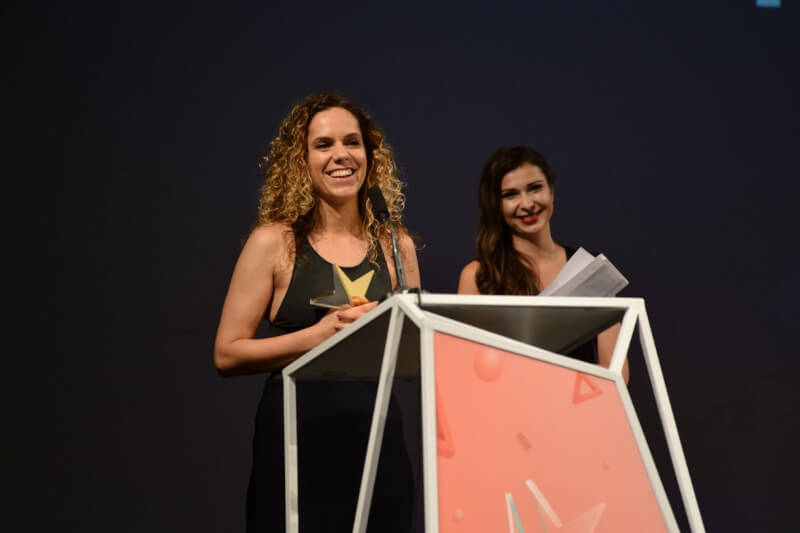
Iva Gicheva-Nikolova: Actually, the shift is not that drastic. In recent years, businesses have increasingly focused on concepts related to social responsibility. Especially post-COVID-19, consumers are more likely to purchase products from brands that support causes they identify with. Businesses possess the power and resources to influence the environment, often more effectively, on a larger scale, and faster than the state. When this effort is combined with partnerships from the NGO sector, the impact can be even more significant.
Ivan: It is crucial for a cause to be genuine; otherwise, it will come across as a superficial adornment on the corporate facade. In Bulgaria, there are both successful and less effective examples of such cooperation.
Dobri: The cause should not appear forced or artificial. The causes that businesses support must be genuinely embraced by the entire company team. When something is inauthentic, consumers can quickly sense it.
ABF: Was there a specific moment that solidified your decision to focus on democracy and social advocacy?
Iva: Originally, the idea was to create something smaller, more like a consulting service that could be managed by a very small team. However, I realized that this sector doesn’t just need occasional advice, even if it’s useful; it needs people who will roll up their sleeves and provide real, hands-on assistance.
People in these organizations are extremely busy, juggling numerous responsibilities. They can’t be expected to be legal experts, lobbyists, analysts, advertisers, communicators, marketing specialists, PR professionals, and media planners all at once.
Communication is a specialized skill. Every campaign involves a diverse team of experts. It’s no coincidence that larger companies often work with multiple advertising agencies. Communication is a daily effort. You can’t just launch a campaign — whether for a product or a cause — and expect to be done. It requires continuous effort to ensure people learn about you, understand your cause or product, like you, and remember you. Effective communication needs to happen every day.
America for Bulgaria: Why The Convo? What kind of conversation are you seeking?
Ivan: Bulgaria needs to have several serious conversations with itself. Bulgarians must discuss crucial topics with their loved ones and within their communities. These topics are not endless, thankfully, but we tend to avoid them.
In search of a more intriguing and versatile name, we embrace the idea of being a convoy, delivering messages where they need to go, guiding them to prevent distortion and miscommunication. Lastly, we want to serve as a gathering place — a place for convocation. Think of it as a hub, a coalition, or a label — a catalyst for collaboration among like-minded, active individuals.
Dobri: Perhaps the most powerful aspect of these three elements is conversation. Our society is filled with dividing lines, but through dialogue rather than monologue, solutions can always be found. As one of the presidents of the European Council once said, the first step when gathering people with different opinions is to start a conversation and find a point of agreement. Then, find a second, a third, and so on.
With the campaigns we create, our goal is to unite and bring people together, not divide them. If we, as a society, can identify even four or five things that unite us, we will be able to coexist much more harmoniously.
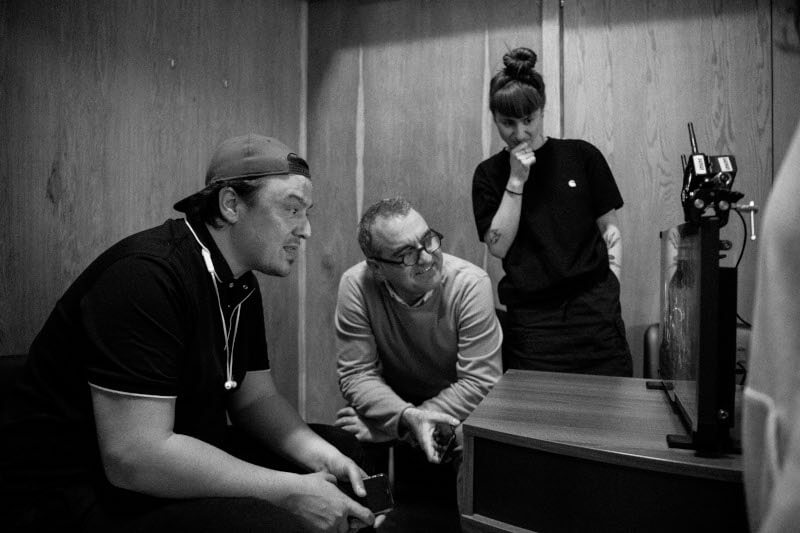
ABF: To what extent does the communication challenge stem from this division and a lack of a common language between the civic sector and the general public? The sector is highly productive, drafting opinions, reports, and recommendations, monitoring the use of public funds, ensuring the needs of the most vulnerable are met, etc.
Ivan: It’s not necessary for top-tier lawyers, such as our friends from the Bulgarian Institute for Legal Initiatives, to possess the skills to translate their deeply professional messages into more accessible language. They also don’t have much time: these are individuals who consult on the drafting of laws, participate in committees, and solve important and complex problems that most of us can’t even imagine. Conversely, the general public cannot be expected to complete a law degree in a year to fully appreciate their work.
Additionally, there are efforts to tarnish the sector’s reputation. As my mother says, “The internet doesn’t write nice things about ‘your people.'” And “my people” is the entire sector. That’s what we are working for — not just to heap praise on them but to provide people with the truth about what these individuals do and how important their work is, in a way that is accessible to everyone.
ABF: On May 9 was the launch of the Democracy Daily project. How challenging is it to promote democracy in a world where trust in it is declining?
Iva: During communism, every enterprise had someone dedicated to propaganda work, convincing people daily of the regime’s advantages. This represented a vast resource of communicators, and it’s no surprise that the attitudes formed from this daily, long-term work are deeply ingrained and difficult to change. Democracy, on the other hand, lacks and doesn’t attempt to utilize such a resource to consistently highlight its advantages.
Ivan: Democracy relies significantly on individual responsibility and self-education. The key challenge is achieving a level of awareness that enables people to understand, evaluate, and make informed choices about what’s happening around them.
Dobri: When the Democracy Daily project started, we had informal conversations with some people who asked, “What’s all this talk about democracy now? I’m concerned about where my child will study, what I’ll put on the table, if I can go to Greece on vacation.” Exactly — that’s democracy in action. It ensures your child can study abroad if they wish to and have the capacity for it, you can go on vacation anywhere in the world, and if you’re talented and hardworking, you can provide a dignified life for your family.
Democracy is also about being able to buy a kilo of bananas whenever, wherever, and as often as you want, not just on New Year’s Eve. Concrete examples from everyday life more effectively illustrate the true dimensions of democracy to people.
Ivan: Interestingly, democracy is a bit like the internet — you notice it when it stops working. For 35 years, it has been our “default setting,” and we don’t appreciate it. How do you appreciate hot water? When it stops, you realize its value. That’s why many of our ideas focus on the obvious things right under our noses.
This is the case with the Mystery of Bulgarian Voices project, aimed at encouraging voting, we illustrate what it’s like when 70% of people are silent and only 30% sing. It doesn’t make a song.
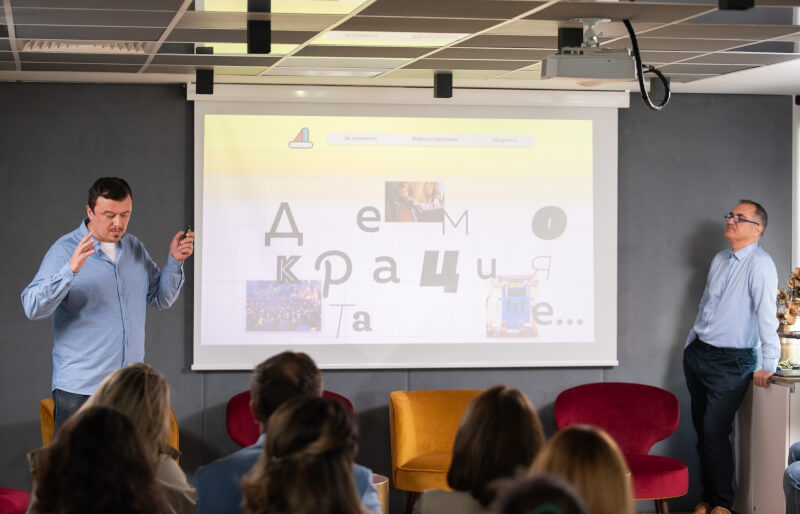
None of us today would be possible before 1989, nor any Bulgarian, even those who criticize democracy. Why? Because today you can take Ryanair and go to London, go to Greece for a vacation without being shot at the border, and your child can study alongside the president’s child at a private school. Before ’89, boys and girls from Dobrich, Popovo, and Plovdiv couldn’t come to Sofia and work at this level. None of this would be possible — especially in culture and business. Who could work the job they have today back then? How many could be photographers or artists? What makes you an artist — your free spirit and expression or a high-ranking group of five deciding who is an artist and who isn’t? We’ve forgotten what we have, and the younger generation doesn’t even realize it.
ABF: What are the key messages you aim to convey through Democracy Daily?
Iva: What I appreciate about this project is that democracy isn’t portrayed as a heavy, abstract, or dry topic. Instead, it’s shown to be all around us, woven into everyday life. We hope that, through this project, people — especially young people — realize that staying informed about the political situation in the country and the world is not only important but also cool. Being informed makes you more valuable and interesting to those around you.
Ivan: I really like the I Am Democracy challenge. It’s a powerful message that encourages individuals to share their personal stories, highlighting that democracy is more than a symbol; it’s an essential part of our everyday lives. Democracy is like air and water—vital and omnipresent. It’s the living environment around us, like electricity. One of the simplest yet most profound messages is my favorite: “Democracy is me.”
Democracy didn’t begin yesterday, nor will it end tomorrow. It is an ongoing process. But it requires our active participation to sustain it. As a flight attendant poignantly remarked in The Sweetest Thing, we must cherish and protect democracy because one morning a madman might wake up and decide we no longer need freedom.
ABF: Are you optimistic about the future of democracy?
Iva: There was a video by Canadian author Margaret Atwood explaining that democracy is a delicate balance, constantly under threat from forces aiming for either authoritarianism or total chaos. When chaos prevails, authoritarian regimes can exploit the situation by claiming, “Only we can restore order.” Democracy, unlike authoritarian regimes, is a delicate balance that is difficult to maintain. It is a process that requires daily effort and commitment.
Currently, we see rising forces attempting to persuade people that democracy is not suitable for us, that our institutions are ineffective, and that our society lacks maturity. They argue that we need strong leaders, not freedom.
This narrative needs a robust counter-narrative, which we and other foundations are working to provide. If we allow the space to be dominated by messages that we are flawed, a small country, incapable, not smart, or lazy, people will gradually start to believe it. However, if enough people work to promote the opposite view, we can tip the scales and achieve a balanced perspective.
Are we optimists? We are realists who recognize that we cannot afford to give up.
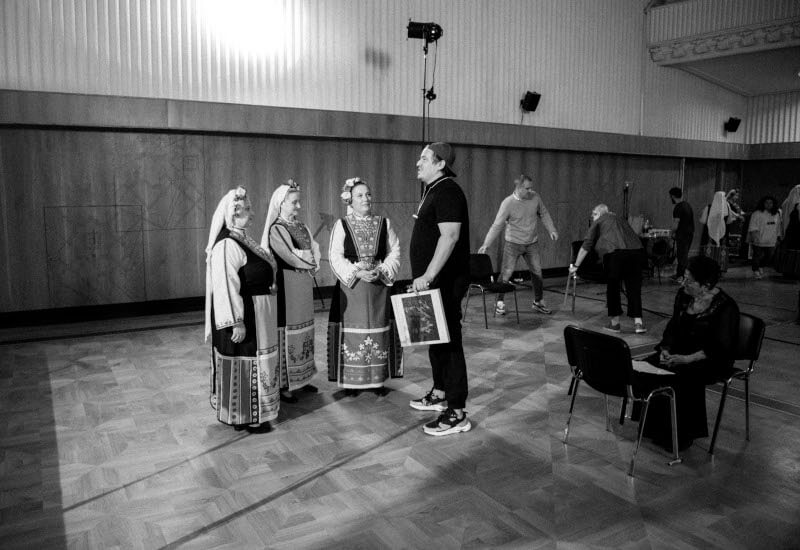
Dobri: I’m an optimist. Over the past 35 years, people have traveled extensively and have fortunately witnessed successful models of government, where citizens enjoy better living conditions and greater freedom. Our NATO and EU membership has significantly contributed to our progress in this direction. I believe we are in the right place and moving in the right direction.
Ivan: As someone in the creative field, I feel a responsibility to be a staunch optimist. While the Democracy Daily logo might resemble a boat, democracy itself is not a boat with a captain at the helm. Instead, it is more akin to heavy city traffic, governed by a few essential rules: “Don’t hit others. Signal your intentions — use your blinkers, horn, hand signals, and signs.” These are simple, concise rules. “Don’t drive under the influence. Don’t become a victim. Maintain a clear vision and stay informed.” If we don’t adhere to these guidelines, collisions are inevitable.
ABF: What is democracy for you personally?
Dobri: For me, the meaning of democracy evolves daily because it is so comprehensive and can be interpreted in countless ways, depending on the situation. For example, I’m planning a trip to Vienna next month with my family, so today democracy means freedom of movement to me — something we didn’t have before. The ability to develop a private business is also a fundamental aspect of democracy. The essence of democracy is also reflected in our freedom of expression — being able to say whatever we want without fear of reprisal or exile to an island in the Danube.
Ivan: To me, democracy means minimal restrictions on ambition, culture, initiative, and creativity. It is the ability to cooperate with others and to weave your own network. Democracy embodies possibilities. It is the freedom to be capable and to act.
Iva: Democracy means having no ceiling.
